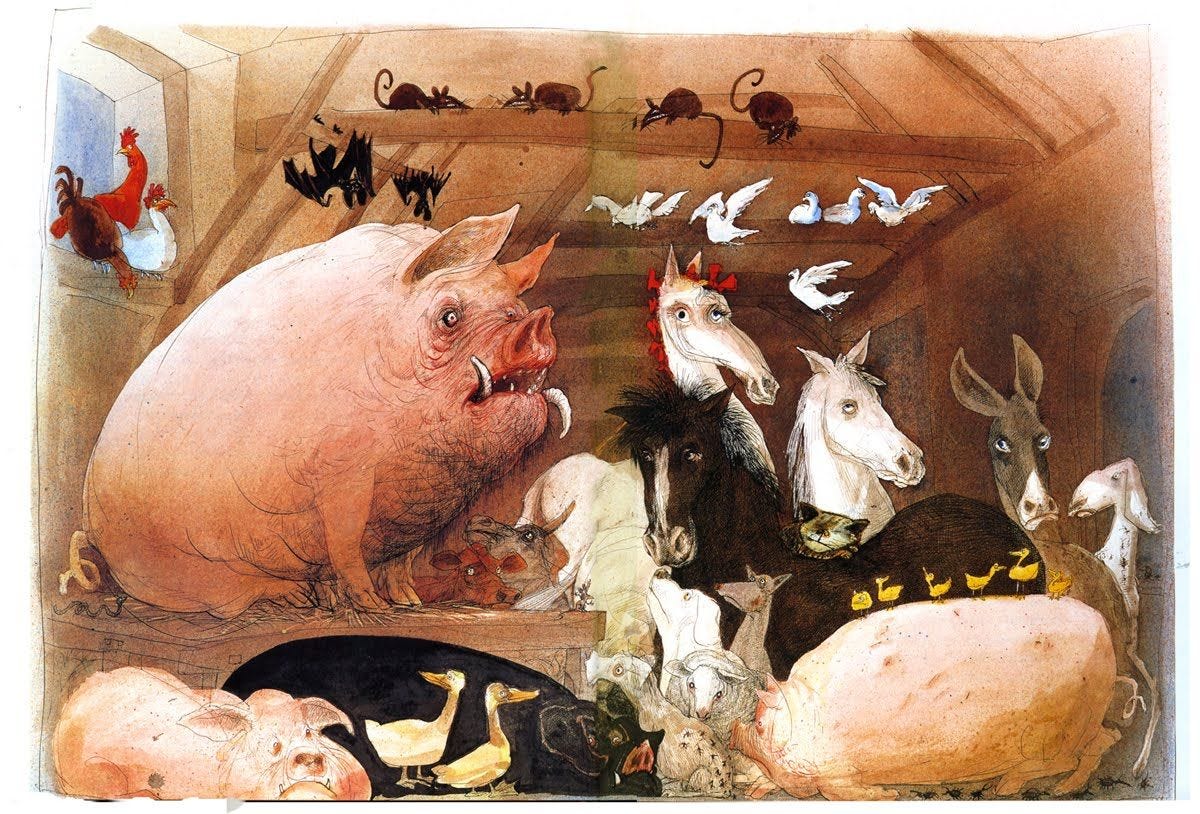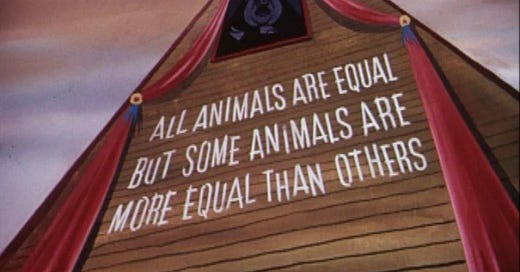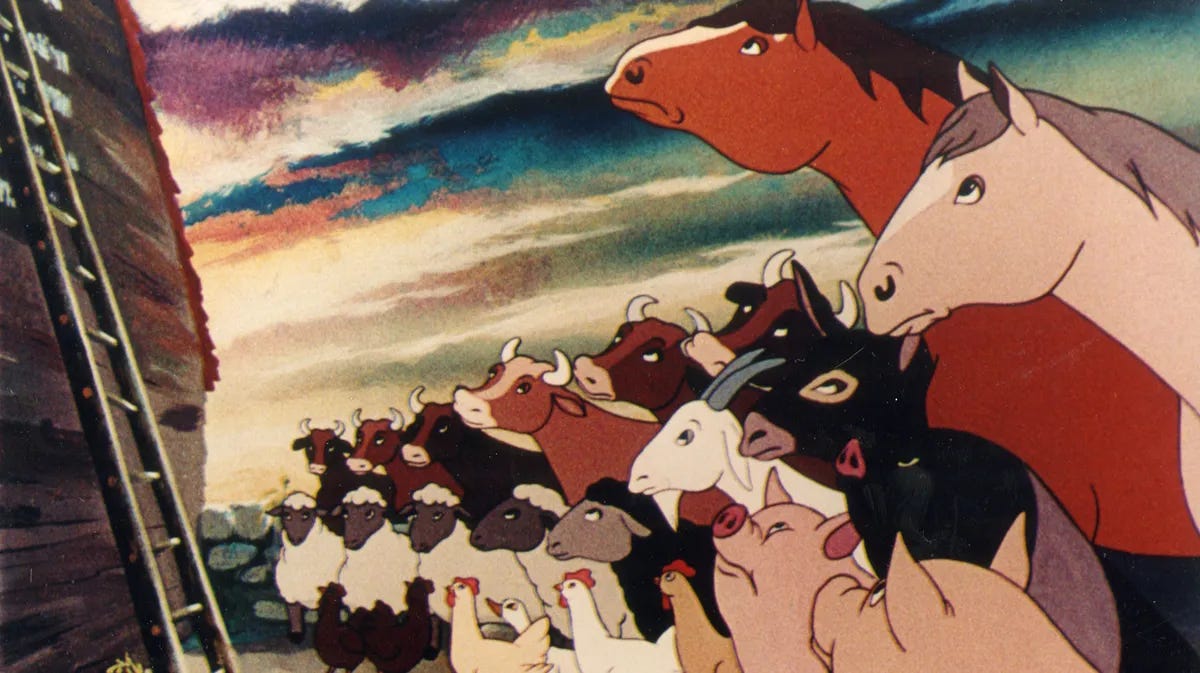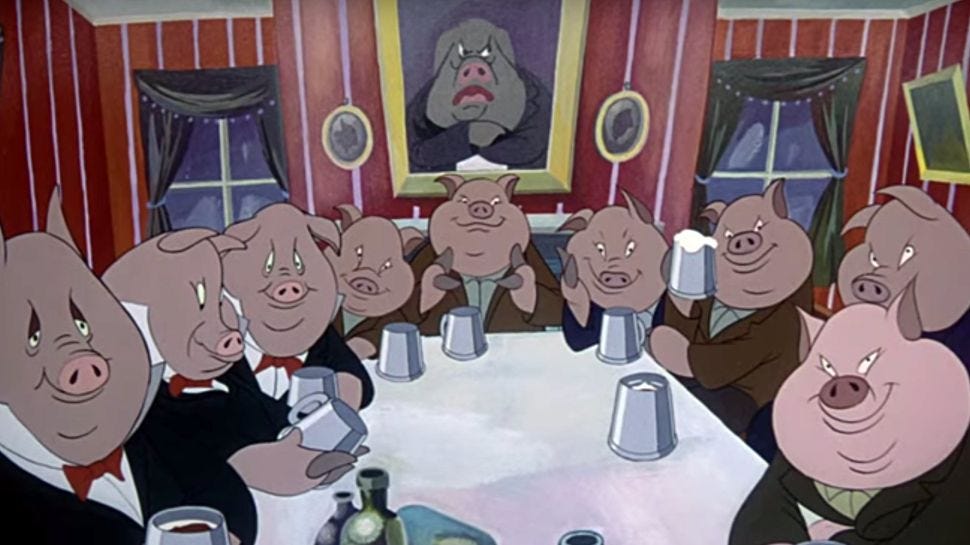Animal Farm Review
The following is from my Culture War Encyclopedia…
Animal Farm is a short novel by George Orwell first published in 1945, a “fairy story” as he put it, told in the form of a fable wherein the main characters are animals. It is actually a dystopian story. Despite its warnings of doom, it is appropriate for pre-teen readers and a delight to read again as an adult. Orwell would later explain in Why I Write,
Animal Farm was the first book in which I tried, with full consciousness of what I was doing, to fuse political purpose and artistic purpose into one whole.
Russel Baker’s writes in the preface to the Signet Classics edition of the book (1996),
It is also a political tract, a satire on human folly, a loud hee-haw at all who yearn for Utopia, an allegorical lesson, and a pretty good fable in the Aesop tradition. . .
Since its first publication at the end of World War II, it has been read by millions. With 1984, published three years later, it established Orwell as an important man of letters.
It contains insight and wisdom and it imparts important lessons. It was consciously intended to be a critique of Leninism and Stalinism specifically, not of socialism in general. As Christopher Hitchens wrote in Why Orwell Matters,
For Orwell, there was always the hope that socialists could be for freedom, even if socialism itself had bureaucratic and authoritarian tendencies.
Nevertheless, its warnings apply to every socialist revolution and every regime that has been established afterwards. In other words, it serves as a critique of socialism in the real world, regardless of Orwell’s intentions. As Russel Baker wrote,
What’s curious was Orwell’s insistence that he had no intention of damaging the “socialist” cause. You would never have guessed this after reading the book, but he insisted that he intended only to write a cautionary story for the democratic West, warning it against a dangerously alien form of “socialism.”
Today this is known as the “real socialism has never been tried” argument. To be fair, Orwell did not have time to see as many socialist revolutions as we have. There have been many socialist revolutions and states established after Orwell passed on. But then again, others during his time were able to see that his story applied to socialism in general. So why couldn’t Orwell himself see it in the very novel he wrote? Russel Baker continues,
Devoted to British socialism, Orwell cannot have found it very pleasant being denounced an enemy of what the Russians, and many of his countrymen too, called “socialism.”
In Why Orwell Matters, Christopher Hitchens writes,
He helped keep alive the socialist press in England through many unpropitious years. . .
Yet on the political and cultural Left, the very name of Orwell is enough to evoke a shiver of revulsion. . .
In some semi-articulated way, many major figures of the Left have thought of Orwell as an enemy, and an important and frightening one. . .
It is true on the face of it that Orwell was one of the founding fathers of anti-Communism. . .
The lessons of Animal Farm apply to socialism in general because the book deals with the aspects of humanity that ensure that socialism in the real world will always bring about misery. So, while consciously intended as a critique of Leninism and Stalinism, but not of “real socialism”, it nevertheless satirizes socialism (in the real world) in general while providing insight into how socialist regimes succeed in gaining totalitarian control.
They succeed in doing so, Orwell shows us, through the inclination of most people towards naïavité, submission to authority, groupthink and self-delusion as well as the inclinations of the minority of people who rule over them towards corruption, hypocrisy and oppression.
The story takes place on a farm.
A horse named Boxer represents the best sort of loyal, hard-working and patriotic person. Other animals such as chickens, cows and ducks also represent working people. The most thoughtless group-minded of humans are represented by sheep. For the most part, politicians are represented by pigs. The figures Trotski, Lenin and Stalin are mirrored by pigs named Snowball, Squealer and Napoleon respectively. The cat is more of a selfish individual than most though he fights alongside the others at one point. Dogs fulfill the role of the police. A raven named Moses represents religous professionals who preach that there is an afterlife wherein everything is wonderful and easy. Benjamin the donkey seems to be the most educated of the animals. He can read very well, is very pessimistic but says very little. A mare named Molly represents vain, shallow, lazy, superficial, self-interested and disloyal people. Humans represent the traditional ruling class.
It begins one night when an aging pig named Old Major calls a meeting. He explains to the other animals of the farm that they are oppressed by humans and that animals could all live easily if they overthrew their human rulers, worked together and shared equally the fruits of their labor.

Soon enough, the animals launch a revolution, driving the farmer, his men and his wife off the farm. They return soon enough with some extra men to carry out a counter-revolution. The animals charge at the men. Snowball does not slow down even when injured by a shotgun blast. The animals drive the humans away. Snowball is awarded a medal.
At first, it seems that the pigs merely help to manage things. They agree to a set of rules and paint these rules on the barn wall for all to see, though most can not read. These are called the Seven Commandments,
1. Whatever goes upon two legs is an enemy.
2. Whatever goes upon four legs, or has wings, is a friend.
3. No animal shall wear clothes.
4. No animal shall sleep in a bed.
5. No animal shall drink alcohol.
6. No animal shall kill any other animal.
7. All animals are equal.
These make up the principles of what they call Animalism, their political philosophy. They also agree that no animal should live in the house where the humans had lived. Snowball summarizes Animalism as “Four legs good, two legs bad.”
Most of the animals mean well and work selflessly towards a better life for all. But some of the pigs set about taking advantage of their good intentions and begin taking steps to gain power. Napoleon raises a new litter of pups, keeping them seperate from the rest of the animals. Being the recipient of all their loyalty, he trains them to serve as his enforcers. At his command, they drive Snowball off the farm, leaving Napoleon no rivals. His power grab accelerates while Squealer is quite capable of convincing most of the animals of anything Napoleon wants them to.
Though the other animals work harder and harder over time and are rationed out less and less food, the pigs enjoy larger portions and better food. The pigs even consume alcohol. To get away with it all, the pigs essentially re-write history. The commandments are altered, the fact that they were altered is denied and then forgotten. Snowball’s role in the revolution is rewritten again and again. He is altered from hero to traitor.
The gauntlet of Napoleon and the other pigs tightens. Some animals are accused of treason and executed. Other animals are too afraid to speak up, even when they know that the killings are wrong. Animals make public confessions of crimes they did not commit and are put to death.
Despite the original rules, the pigs live in the house, sleep in the beds, drink alcohol and have business dealings with humans, forging relationships with the humans that are advantageous for the pigs but not for the other animals. Life for the other animals is as it was before the revolution; hard. The years pass. The spirit of revolution and Animalism fades away. The pigs begin to walk upright and it becomes difficult to tell them apart from the humans.
Though it was first published in 1945 when Stalin was supposed to be a good guy because the Soviets were among our allies in the fight against the Nazis, the pig modelled after Stalin, is the biggest villain of the story. As Russel Baker wrote of Orwell,
He thought too many decent people in the Western democracies had succumbed to a dangerously romantic view of the Russian revolution that blinded them to Soviet reality.
Though one incarnation of national socialism - Nazi Germany - was the enemy, an other form of national socialism - the U.S.S.R. - was an ally at that time (yet it would soon become the enemy in the cold war). But Orwell was among those who knew that Stalin was not much better than Hitler.
Orwell had come to understand these things from the perspective of an English socialist who had some inside knowledge of and personal experience with Stalin’s Soviet government. Orwell had travelled to Spain to volunteer as a soldier on the socialist side of the Spanish Civil war. Baker writes that,
Out of that experience came Animal Farm. An attack on the myth of the nobility of Soviet communism, Animal Farm became one of the century's most devastating literary acts of political destruction. . .
Orwell, of course, was seldom happier than when he was attacking fraud and hypocrisy and hearing the squeals of the injured.
As well as personal experience, Orwell gained insight via paying close attention to reports of what was happening in the U.S.S.R. that were being smuggled out to the West but that were getting far too little attention. In his preface to the book, Baker quotes Orwell as writing,
“…it was of the utmost importance to me that people in Western Europe should see the Soviet regime for what it really was.”
So, despite what the author intended, it is a fact that his criticisms of Soviet socialism apply to socialism in general. Moreover, his critique of human stupidity in the face of political power grabs remains as relevant today as ever. We still see people blindly following leaders and herds. We see people falling for the revision of history. We see people engaging in blatant hypocrisy.
They do not say “All animals are equal, but some animals are more equal than others” but they claim, on the one hand, that all women should be believed when they accuse men of sexual misconduct, then claim, on the other hand, that men can be women. They claim to be anti-racist while being racist. They pretend to be against fascism while being openly against freedom. Religion is bad but Islam is good. Sexism is bad but Islam is still somehow good. Abortion is OK but somehow Islam is OK too. Criticism of homosexuality is bad, but somehow Islam is good. There is no end to their self-contradiction. All white people are racist and it is racist to see differences in people of different colors. Men are sexist against women but gender is a social construct.
As Christopher Hitchens wrote in Why Orwell Matters,
There isn’t much room for doubt about the real source of anti-Orwell resentment. In the view of many on the official Left, he committed the ultimate sin of ‘giving ammunition to the enemy’.
Animal Farm is a classic dystopian story. I recommend that young people read this novel along with 1984, Brave New World and Fahrenheit 451 if not others.
Thanks for reading. Please see my other reports, my videos, and consider donating.
Liberty my right ∴ Truth my sword
Laughter my shield ∴ Knowledge my steed
Love my solace ∴ Honor my reward





